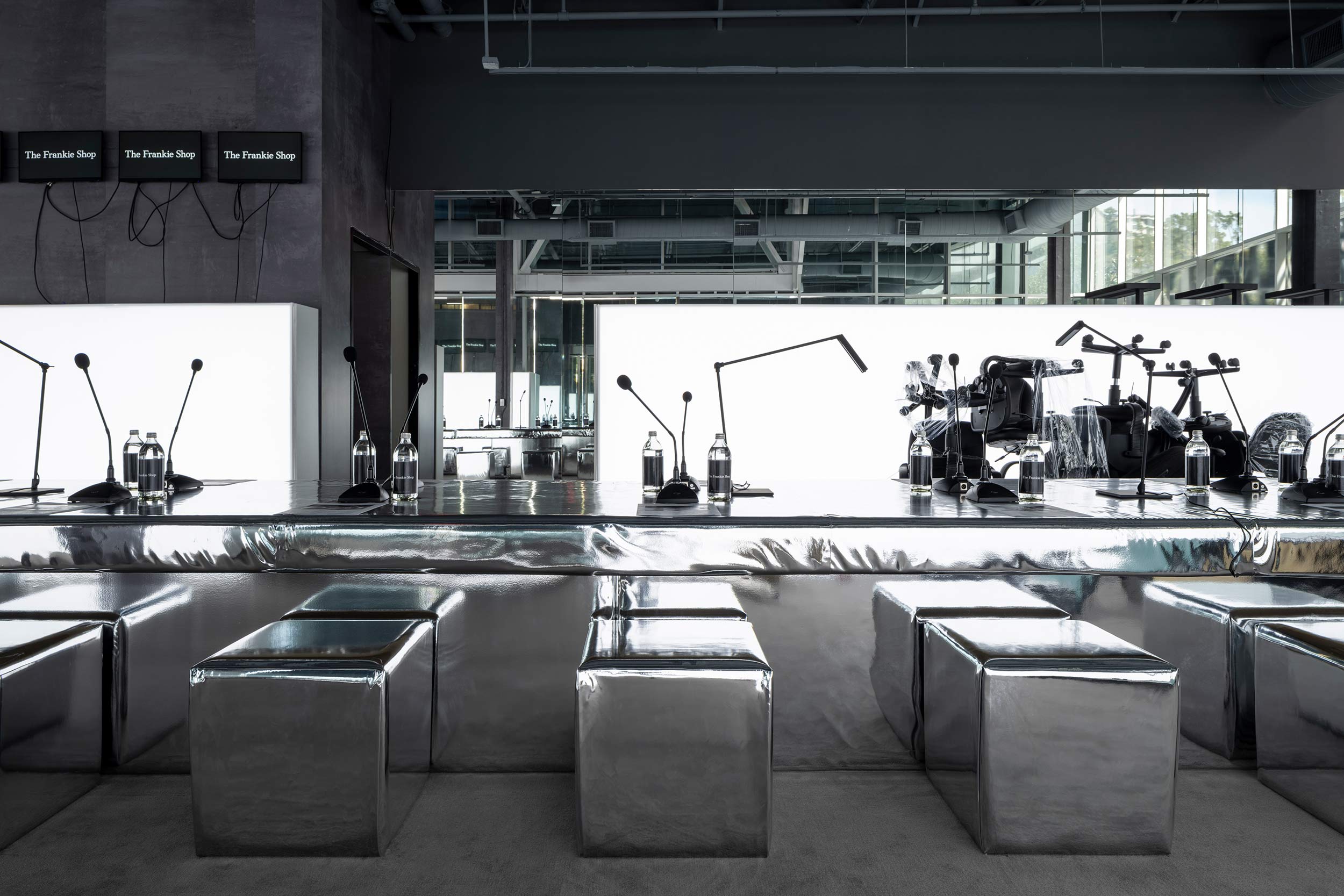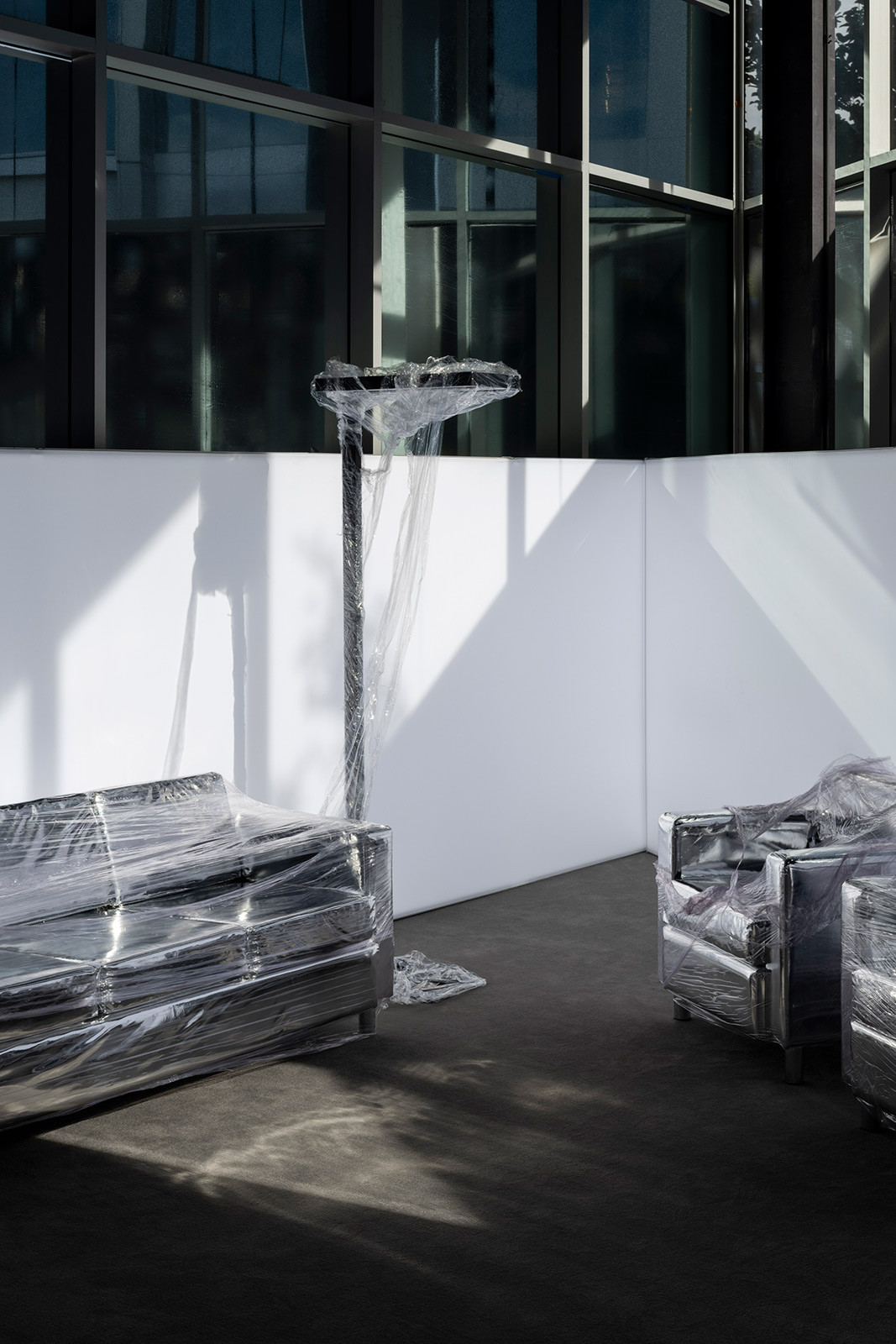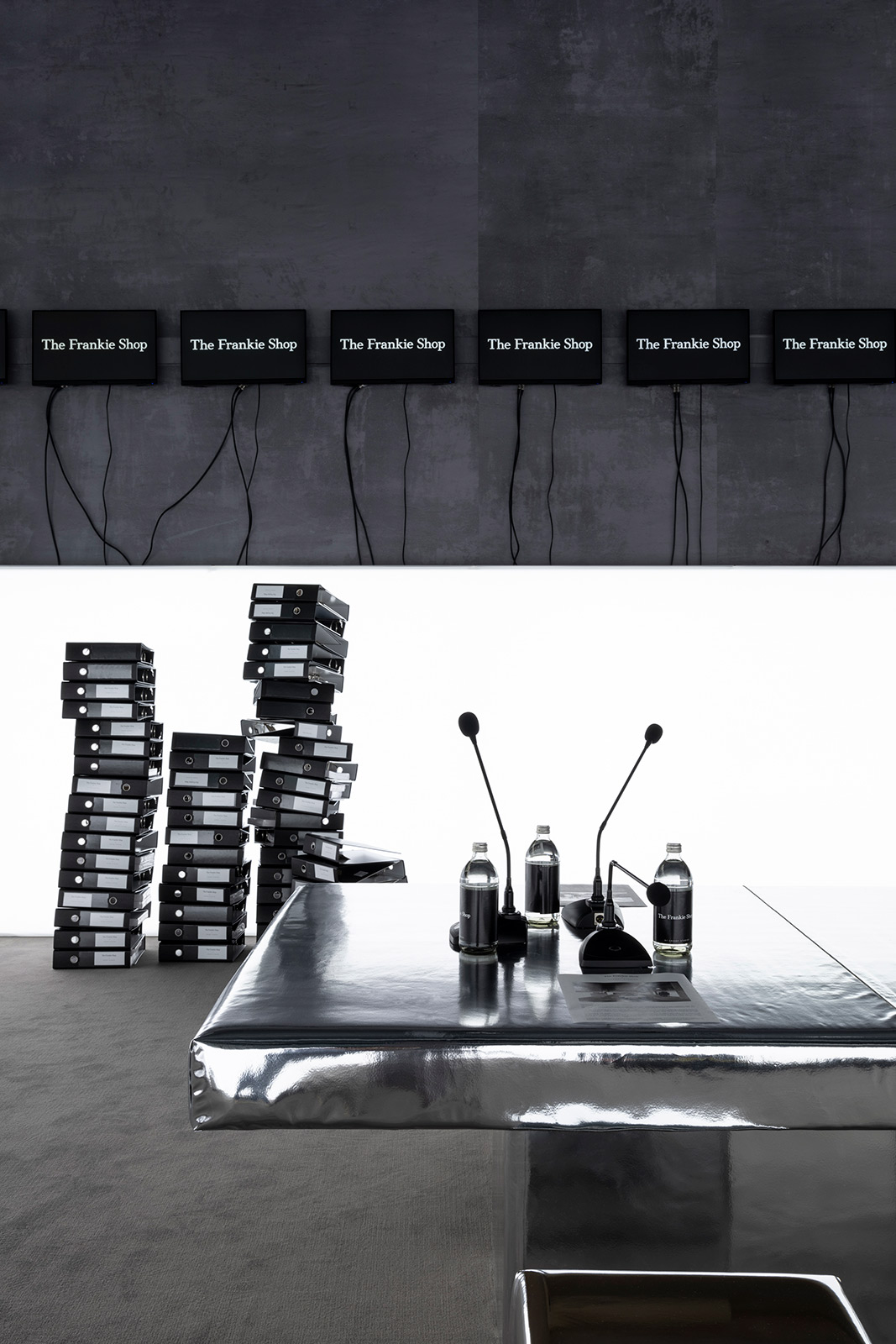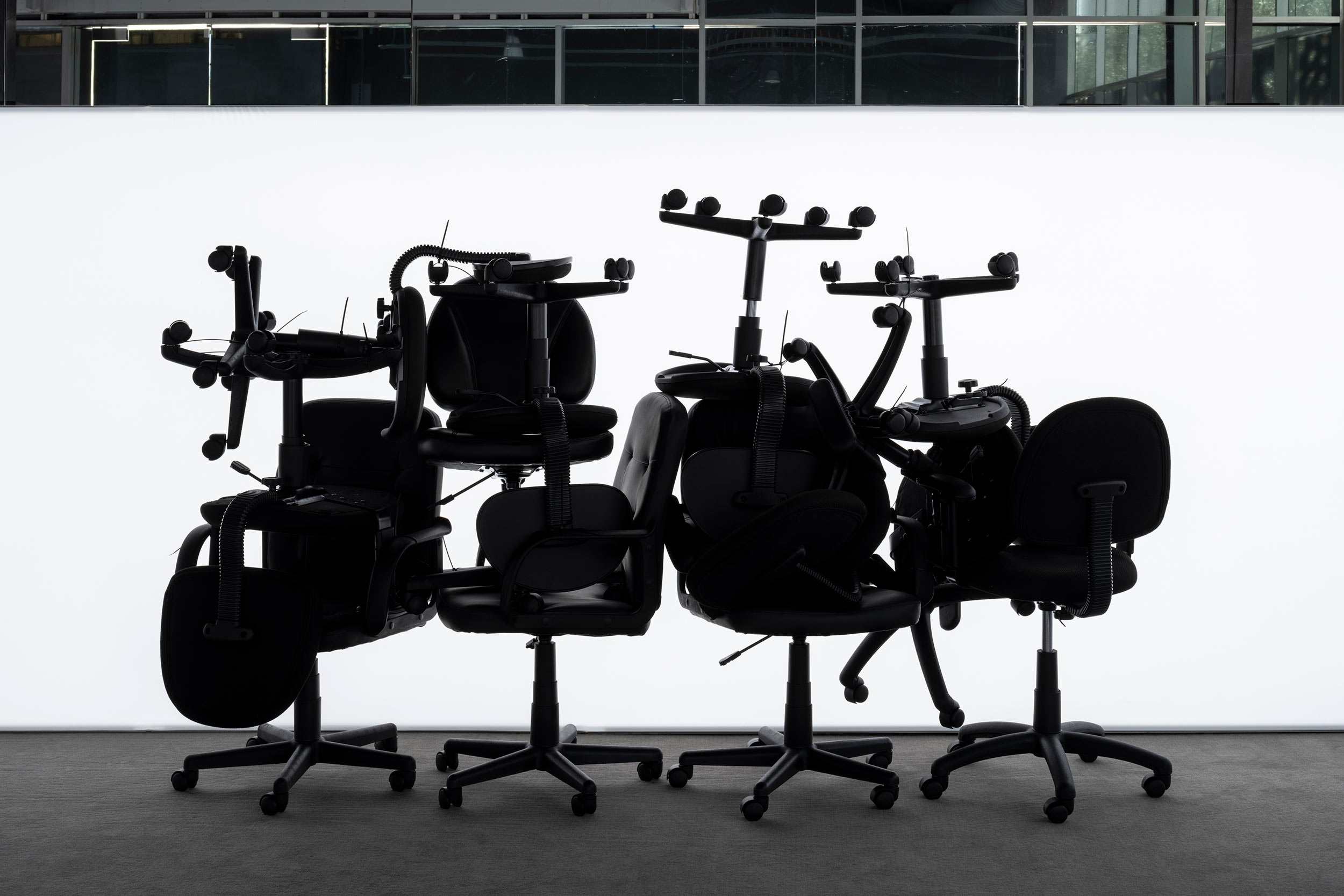Brand founder Gaëlle Drevet and Crosby Studios architect Harry Nuriev sit down with Document to discuss their office-themed LA pop-up, power dressing, and Demi Moore
The Frankie Shop woman walks around in oversized power suits, evoking an intelligent confidence. That’s who Gaëlle Drevet wanted to dress when she started The Frankie Shop nearly a decade ago. First a concept store in New York’s Lower East Side, the shop later became a clothing brand intent on creating affordable, everyday women’s office wear with a twist. The New York- and Paris-based brand’s eponymous line brings new meaning to the idea of comfortable chic, with its signature oversized suiting and shirting, earning fans like Jennifer Lopez, Hailey Bieber, and Gigi Hadid. Harry Nuriev, the architect mastermind behind Crosby Studios, who has worked with Balenciaga, Avgvst, and most recently the new Silencio nightclub in New York, and now he’s collaborating with The Frankie Shop on a retail environment.
Demi Moore was a natural choice to exemplify the brand’s signature power dressing for “The Frankie Shop Goes to Hollywood,” their latest campaign, conceived by New York-based cultural collective Unemployed Agency and photographed by Collier Schorr. In one of the images, the actress sits in one of Nuriev’s silver office chairs dressed in head-to-toe navy pinstripes, evoking the strength and power that defines The Frankie Shop woman.
The Frankie Shop and Crosby Studios partnered for a Los Angeles pop-up shop located in the middle of West Hollywood at 8580 West Sunset Boulevard until March 24. Nuriev came up with the idea to display the clothing in an office environment, but not just any office—he wanted to capture that moment in time before a company moves out, referring to it as the “End of Office Era.” Shrouded in Crosby Studios’s signature silver, The Frankie Shop’s space is dotted with copy machines, desk chairs, and a giant boardroom table.
Document sat down with Harry and Gaëlle over Hailey Bieber’s Erewhon pink-and-white smoothie, hours before the opening party on February 23—attended by Kim Gordon, Dree Hemingway, and of course, Demi herself—to discuss their first meeting, power dressing, and how they knew Moore was The Frankie Shop woman.
Ann Binlot: The Frankie Shop has locations in Paris and New York. Why Los Angeles for this pop-up?
Gaëlle Drevet: It was definitely not next on my agenda. But I’ve always had in mind to do something in Los Angeles. When I met Harry, he’s the one who said, ‘We should do Frieze, right?’ I was like, Oh, Los Angeles. That was it. I basically reshuffled my schedule.
Ann: How did you two meet?
Gaëlle: Through Instagram. I’ve been following Harry for a little while. I admire his work and I appreciate everything he does. I went to one of his events, and I posted his name on our social media and this conversation started from there. When we met, we probably put 30 minutes on his schedule and same for me. We ended up speaking for two hours at his house. We would still be there if it wasn’t for a few appointments that day. Harry, why did you decide on this crazy project with us?
Harry Nuriev: Collaborations like this are rare—when there’s mutual synergy and everything goes so naturally. All our decisions were made in a second. I really like that because you know, we obviously had freedom and creative control to basically think not just about this space, but also the geography and location.
Gaëlle: This was the beginning of a new friendship.
Ann: Was an installation around the idea of an office an obvious choice?
Gaëlle: Yes. For him, I don’t know. Harry, was this obvious? It’s true that I don’t do colors. I mean, look at me. I’m wearing gray.
Harry: We don’t really do colors either. I mean, we used colors for a few years—everyone just decided it was like an episode in our creative practice. I’m personally always inspired by powerful women and this was a very organic thing. When you’re inspired by something, when you feel a touch, and when you have this curiosity, then the whole thing is easy. We didn’t have any obstacles on this side. Plus, we believe in the future. What attracts me is that it’s a completely new letter in the alphabet, and nothing really has been done like this before. It’s kind of in our DNA too, because we started to also reject existing interior-design environments to do something different. It’s a new category. Our understanding ended up in the office concept.
Gaëlle: We are similar in terms of how we want to disturb the way things are and the way things work. Even for the event that we have tonight, for example, people are not going to see any clothes, so I’m sure they’re going to be like, ‘What the hell’s going on here?’ [That choice] is a way to say that you can talk about a brand differently. There are many different ways to do marketing, there are many different ways to say something about a brand, and it could be through interior design. It could be food. I could be through human experience. What Harry has created in this space is very much a design that matches that first conversation—the magic happened after that. What we are going to reveal tonight is the result of a collaboration based on a mutual love of minimal things, but it’s also a little edgy, just like what The Frankie Shop does with everyday clothes—we adjusted volume, and that’s what I think the space is about; we just adjusted the volume. I like that. Harry, are you excited about the party tonight?
Harry: First, I want to bring the LA community together—from the fashion and design and art scenes—and share what we’ve been working on for the last two months. It’s a bridge between fashion and design. Second, it’s a very nice time in LA right now where we can actually capture a lot of different [social] overlaps. We have Frieze coming up and it’s the film festival right now. It’s cool to be intertwined with different environments. The most important thing is just to see you, and see our friends and family, and celebrate what we achieved. It’s a very monumental project for both of us.
Ann: Where did you source the photocopy machines and office equipment?
Harry: We sourced a bunch of things that were leftover from [vacated] offices. We’re talking about the “End of Office Era”—we’re talking about what’s going to happen when the office is gone. The installation is capturing the second before a moving company will come in and take all the chairs and monitors and these dysfunctional things away. They’re almost like dinosaurs. We don’t know what’s going to happen in this space yet. But we already know that there’s a new order coming in with a powerful leader. That’s the role Demi Moore plays. We don’t know what her style is in the office or how she wants to arrange everything, but we really feel the positive energy of change. And that’s going to be like a last meeting at this long table, almost like a last supper. Then the new office era will start, which will be completely different. We want to capture this moment before, and I kind of like the idea that I don’t really know what’s going to happen after.
Ann: Why Demi Moore for The Frankie Shop campaign?
Gaëlle: Demi has always been a super fierce and powerful personality for me. She shaved her head when she did GI Jane. She made difficult choices for women. She represents a woman of firsts: first time a woman had a starring role in an action movie. The first woman who had the highest salary, all these firsts that you need someone to achieve. She really represents a confident personality that I want to be associated with.
Harry: This is also the first project where we’re working with talent. She’s more than a campaign face. She’s kind of like the ambassador of the whole project, which I’m super proud of.
Ann: The Frankie Shop has been around for nearly a decade. How do you manage to stand out in an oversaturated market?
Gaëlle: I find a niche situation. With my price point, I’m not luxury, but I’m not fast fashion. So it’s in between, which is a bit of a niche situation that people appreciate. We don’t make disposable clothes, we make clothes that you keep. You don’t have to pay thousands of dollars for them. It’s also gender fluid, it’s everyday, but with a little twist, which hopefully I can continue to do, but I still sell items from five years ago. I don’t believe in putting everything on sale. I believe in owning things in your closet that will last and don’t cost thousands. It’s just a silhouette that you need for your everyday wardrobe. We’re here to stay, I would say.













